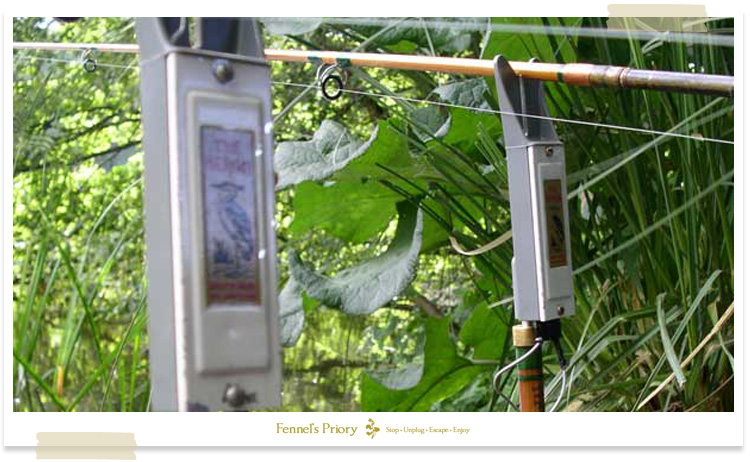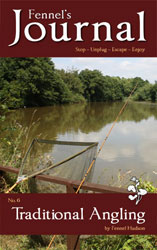
The Great Electricity Debate
The electric bite alarm is potentially the most contentious item of tackle for traditional bait (coarse) fisher. Tackle shops and magazines will claim it is an essential item. Others will say that using one is cheating.
"The beginning of technology’s real invasion was probably the first uses of electricity. To the first buzzer bite alarm much blame is to be attributed. From that point, the path has run downwards, away from the sensitive ancient delights towards the takeover of lifeless technology…the electrical bite alarm. At once and instinctively I recoiled from it. It was introducing to me and the fish a foreign, unnatural element. It was outside the frame of nature. It was intrusive, jarring, not nearly as thrilling as the silent slipping of line through the fingers in the pitchy night. Anyway who, properly attendant on his rod, should need such a thing?"
So wrote Bernard Venables in his Illustrated Memoirs of a Fisherman (Merlin Unwin, 1993), a book that stands alongside his Gentle Art of Angling and Fisherman’s Testament as essential reading for traditional anglers. Bernard’s point was clear: that the introduction of electricity to angling marked the beginning of its downfall as an art form. The topic is one of the most talked-about subjects amongst traditional anglers.
For years, having read Bernard’s writing and having discussed the topic with him first hand, I deliberated whether I should or could use electric bite alarms and a torch when fishing. I could see their benefits – that they allowed me to fish ‘efficiently’ at night and for long periods of time – but I always had the niggling doubt that using them was somehow lessening my enjoyment of the sport.
I managed to fish at night for three years without the aid of a torch, but eventually conceded after my box of matches got soaked and I was unable to light my Tilley lamp. I now carry a lightweight LED head torch that is discrete and easy to carry in my coat pocket. I held out a bit longer regarding the bite alarm.
In the past, when I was younger and more eager to prove my ability to catch fish, I would go fishing for several days (sometimes weeks) at a time. For two years I fished every night after work (arriving at dusk and leaving at dawn – even in winter), avoiding sleep so that I could be 'properly attentive' at my rods. Holding the line, or watching silver foil hanging on the line as I awaited a bite, proved exhausting. Sleep deprivation and an obsessive focus had robbed me of the relaxation that fishing brings.
Centrepins were my first solution, using their ratchet to wake me if I was sleeping. But that limited me to fishing very close in, and I missed a number of 'drop back' bites and 'twitch bites'.
Eventually I resorted to using electronic Heron bite alarms – the ones used in the 1950s and 60s – as they were ‘traditional’ and would at least allow me to get some sleep. Their downside, like with all electric bite alarms, was the unnatural sound they made – a sound that shattered the tranquillity of a waterside scene. And, again, they'd only register when the line pulled tight. Okay if using running leads, but no good with freelined bait or semi-fixed legers.
I later discovered the small (original size) Gardner TLB buzzers that produce a nice ‘peep’ similar to the call of a Kingfisher. With the line passing over a roller rather than an antenna, they give an indication of the speed of the running fish, and register drop-back bites. I purchased a pair of these alarms and replaced their stainless steel facias with ones of bamboo. They looked discrete, and served me well, until the seals went in a rainstorm. Today I have a paid of the newer TLB alarms, again with a stainless front, but with the larger 'speaker' on the front. I reduce the noise of the beep by part-covering the hole at the front with tape. It works for me. Nice and simple. Though I'm still mindful of the thought of 'cheating', and wonder what Bernard would make of it all.
It's not the alarm that's the issue, more the sendentary and long-stay style of angling. 'Bivvy life', as it's known, cocoons the angler from what's happening beyond the millimetre-thick nylon skin of his tent. He's nice and cosy, for sure, but all that tackle makes it harder for him to 'up sticks' and move swims, or adopt a mobile stalking approach. So if you're fishing with one rod, for short lengths of time, then leave the bite alarm at home. Besides, a float is far more beautiful, hypnotic, and silent.
 If you like this blog, you'll like Fennel's book Traditional Angling.
If you like this blog, you'll like Fennel's book Traditional Angling.
Please also subscribe to the Fennel on Friday weekly email. You'll receive either a blog, video or podcast sent to you in time for the weekend.



